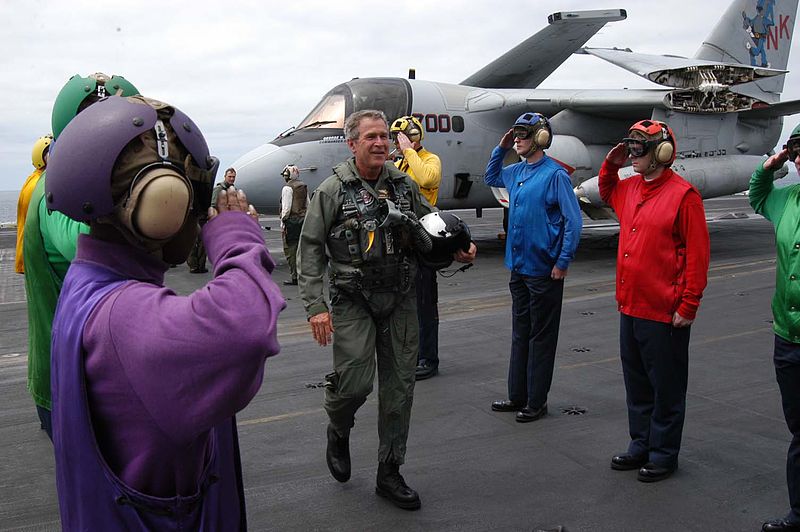The Bush Administration and its principals — including George W. Bush, Richard B. Cheney, Donald M. Rumsfeld, Condoleezza Rice, and Paul D. Wolfowitz — may have violated international law by initiating the Iraq War.
Accordingly, Iraqis who suffered harm during the Iraq War may have causes of action under international law not only against those directly responsible for any harms they have suffered, but also directly against Bush Administration officials.
First, the Bush Administration may have violated international law by conspiring and waging a war of aggression. A war of aggression is the “supreme international crime,” and was the chief cause of action against Nazi leaders in Nuremberg. The Nuremberg justices wrote:
The charges in the Indictment that the defendants planned and waged aggressive wars are charges of the utmost gravity. War is essentially an evil thing. Its consequences are not confined to the belligerent states alone, but affect the whole world.
To initiate a war of aggression, therefore, is not only an international crime; it is the supreme international crime differing only from other war crimes in that it contains within itself the accumulated evil of the whole.
Was the war against Iraq, similarly, a war of aggression? Witness Iraq says yes.
As early as 1997, members of the Bush Administration were calling for the military overthrow of Saddam Hussein through a non-profit called The Project for the New American Century.
Their efforts included a letter to President Clinton signed by Donald M. Rumsfeld and Paul D. Wolfowitz arguing that the United States implement “a strategy for removing Saddam’s regime from power. This will require a full complement of diplomatic, political and military efforts.”
From 1997 to 2000, The Project for the New American Century issued reports with such titles as, “A Way To Oust Saddam,” and “How To Attack Iraq.”
When George W. Bush became President, he appointed Richard B. Cheney as Vice President, Donald M. Rumsfeld as Secretary of Defense and Paul D. Wolfowitz as Deputy Secretary of Defense — all three of whom were founding members of The Project for the New American Century.
According to British journalist John Kampfner, the day of the 9/11 attacks, Wolfowitz and Rumsfeld openly pushed for war against Iraq – despite the fact that the 9/11 hijackers were Saudi Arabian and had been based out of Afghanistan.
Rumsfeld asked, “Why shouldn’t we go against Iraq, not just al-Qaeda?” with Wolfowitz adding that Iraq was a “brittle, oppressive regime that might break easily—it was doable.”
Kampfner writes, “from that moment on, he and Wolfowitz used every available opportunity to press the case.”
According to Kampfner, “Undeterred Rumsfeld and Wolfowitz held secret meetings about opening up a second front—against Saddam. Powell was excluded.”
The Bush Administration adopted the plan to invade Iraq at least by September 12, 2002 – a little more than a year after the first anniversary of 9/11. In a speech to the United Nations General Assembly, President Bush outlined the threat of terrorism, remarking:
In cells and camps, terrorists are plotting further destruction, and building new bases for their war against civilization. And our greatest fear is that terrorists will find a shortcut to their mad ambitions when an outlaw regime supplies them with the technologies to kill on a massive scale.
In one place — in one regime — we find all these dangers, in their most lethal and aggressive forms, exactly the kind of aggressive threat the United Nations was born to confront.
The regime at issue: Iraq.
Under international law, a country may only go to war (1) in self-defense or (2) if approved by the United Nations Security Council. The United Nations did not authorize the Iraq War, which means the central question of any claim of aggressive war would be whether the war in Iraq was initiated in self-defense.
At Witness Iraq, we believe that the overwhelming amount of evidence that has come to light since the invasion confirms that the Iraq War was a premeditated “war of choice” (to use President Barack Obama’s phrase) that likely violated international law and amounted to a war of aggression.
This was the conclusion reached by former United Nations Security General Kofi Annan, who in 2004 unequivocally called the Iraq War “illegal.”
Second, it may be the case that the Bush Administration violated international law by authorizing and engaging in torture. Torture includes, but is not limited to, the use of water-boarding and other “enhanced interrogation techniques.” Because there has been no formal investigation into Bush-era abuses, there is no way to know if the use of torture was widespread.
Third, it may be the case that the Bush Administration violated international law by using depleted uranium, the use of which may have violated international treaties.
Fourth, it may be the case that the Bush Administration violated international law by destroying the cultural heritage of Iraq. Both international treaty as well as the Nuremberg Trials provide the legal basis for a cause of action if it can be shown that cultural artifacts and centers were targeted for destruction during war.
Fifth, it may be the case that the Bush Administration violated international law through unlawful deportation or transfers of Iraqi civilians, which is a “grave breach” under the Geneva Conventions (see Articles 49 and 147 of the Fourth Geneva Convention).
